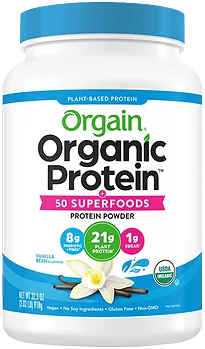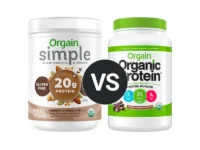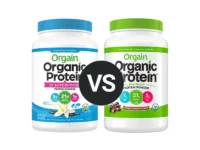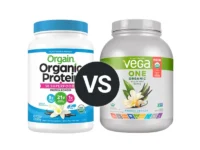Knowledge BaseYou're Questions Answered
Are there any health benefits to using organic protein powders?
Organic protein powders have become increasingly popular in recent years, as consumers seek out more natural and sustainable products. While research specifically on the health benefits of organic protein powders is limited, there are several reasons why choosing organic may be beneficial.
Firstly, organic farming practices avoid the use of synthetic pesticides and fertilizers, which can leave harmful residues on crops and negatively impact the environment. Organic crops have also been found to have higher levels of certain nutrients, such as antioxidants, compared to conventionally grown crops (1,2).
Secondly, organic protein powders may be more digestible for some individuals, as they do not contain artificial preservatives, flavors, or colors that may cause digestive issues or allergic reactions. Additionally, some studies suggest that organic protein sources, such as organic milk, may have a different composition of fatty acids compared to conventional sources, which could offer additional health benefits (3,4).
It is important to note that just because a protein powder is organic does not necessarily mean it is healthier or more nutritious than a non-organic option. The quality and nutrient content of the protein powder will depend on several factors, including the source of the protein, the processing methods used, and the other ingredients included.
Overall, while the health benefits of organic protein powders are not yet fully understood, choosing organic may be a way to support more sustainable and environmentally friendly farming practices.
- Barański M, Srednicka-Tober D, Volakakis N, et al. Higher antioxidant and lower cadmium concentrations and lower incidence of pesticide residues in organically grown crops: a systematic literature review and meta-analyses. Br J Nutr. 2014 Sep 14;112(5):794-811. doi: 10.1017/S0007114514001366. Epub 2014 Jun 26. PMID: 24968103.
- Benbrook CM, Davis DR, Heins BJ, Latif MA, Leifert C, Peterman L, Butler G, Faergeman O, Abel-Caines S, Baranski M, Rembialkowska E, Hoorfar J. Enhancing the fatty acid profile of milk through forage-based rations, with nutrition modeling of diet outcomes. Food Sci Nutr. 2018 Oct 30;7(1):935-945. doi: 10.1002/fsn3.644. PMID: 30680125; PMCID: PMC6337445.
- Palupi E, Jayanegara A, Ploeger A, Kahl J. Comparison of nutritional quality between conventional and organic dairy products: a meta-analysis. J Sci Food Agric. 2012 Mar 15;92(4):2774-81. doi: 10.1002/jsfa.5639. Epub 2012 Jan 18. PMID: 22253048.
- Chiu S, Williams PT, Dawson T, et al. Diets high in protein or saturated fat do not affect insulin sensitivity or plasma concentrations of lipids and lipoproteins in overweight and obese adults. J Nutr. 2014 Apr;144(4):537-43. doi: 10.3945/jn.113.189402. Epub 2014 Jan 29. PMID: 24477298; PMCID: PMC3955879.
Related Questions
Related Reviews

Your Answer
We are a participant in the Amazon Services LLC Associates Program, an affiliate advertising program designed to provide a means for us to earn fees by linking to Amazon.com and affiliated sites.






